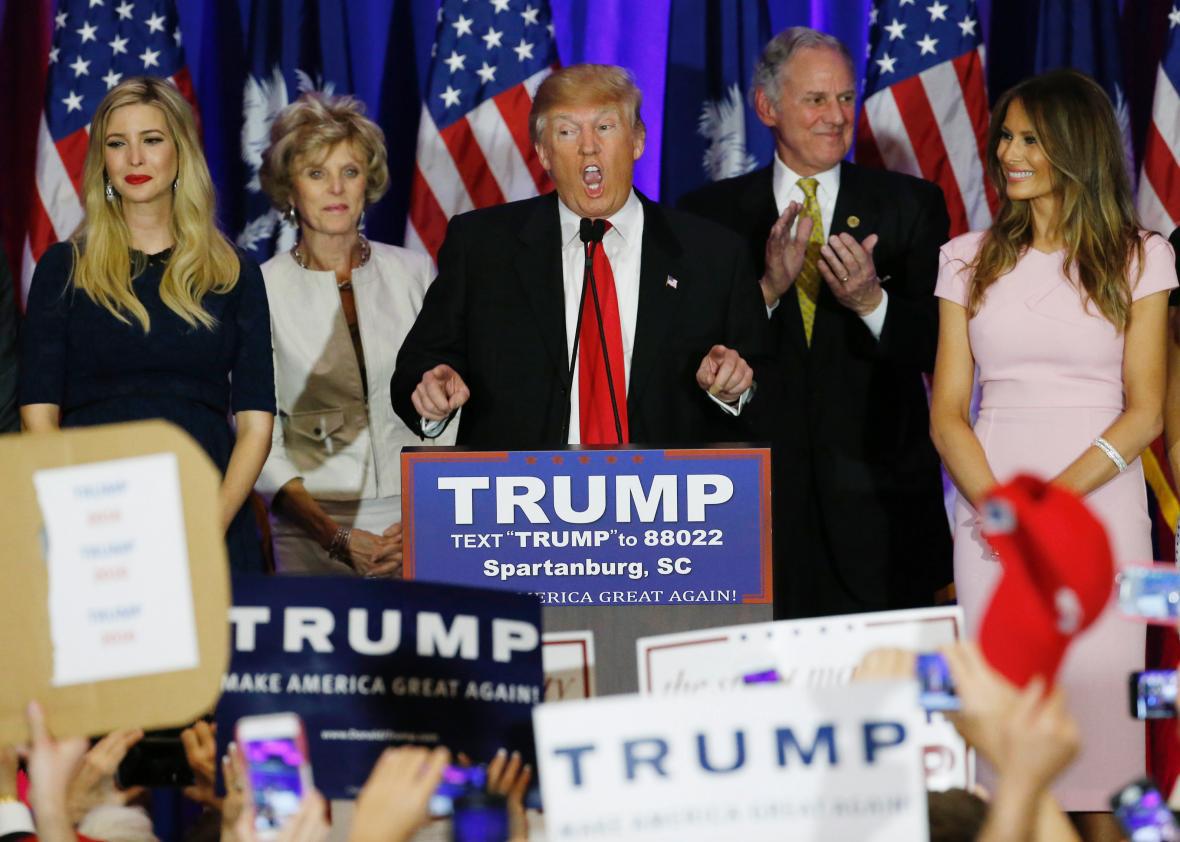Donald Trump won South Carolina’s 2016 Republican primary on Saturday, giving the former reality television star his second victory in a major presidential nominating contest in the past two weeks. If the Republican Party wasn’t terrified before, they are now.
In the past six GOP primaries without an incumbent, New Hampshire and South Carolina have been won by the same candidate three times—and all three went on to win the nomination. With the exception of Newt Gingrich in 2012, meanwhile, every single South Carolina winner since 1980 went on to become the eventual Republican nominee. Those are admittedly small sample sizes, but they are nonetheless cause for serious concern for the GOP establishment. Trump now has two primary victories to go along with a second-place finish in Iowa. Meanwhile, the Republican Party’s best hope to restore order to the race, Marco Rubio, finished third in Iowa, fifth in New Hampshire, and will do no better than second in South Carolina.
We’ll have to wait for the final results to see how much Trump’s margin of victory will be, but early exit polls showed him winning the support of about one-third of South Carolina voters. That’s right about where he’s been polling in recent weeks, and only a few ticks below where he was in Palmetto State polls at the start the year. Trump wasn’t afraid to take some risks in the final days before South Carolina either; this past week he attacked former President George W. Bush—still a popular figure in the Republican Party—in a GOP debate and feuded with Pope Francis. Trump, though, has proved time and again that he can slaughter a sacred cow in primetime without causing his fans to flinch.
Trump’s momentum is likely to continue, too. He’s currently polling more than 20 points ahead of Rubio and Ted Cruz in Nevada, which will hold its GOP caucus on Tuesday. Next up after that contest will be Super Tuesday, which is dominated with the type of southern states that, according to polls, seem eager to buy what Trump has been selling on the stump.
The billionaire’s rivals, meanwhile, will be left to pick up the pieces. Rubio and Ted Cruz appear likely to finish in second and third, in some order, but both will have a difficult time spinning that into a moral victory. Cruz will face doubts about whether he can expand his base beyond the evangelical voters who delivered him a win in Iowa, a limitation that proved to be the undoing of the Hawkeye State’s previous two GOP caucus winners, Mike Huckabee and Rick Santorum. Rubio, meanwhile, will use the South Carolina results to argue that his party-approved rivals—Jeb Bush and John Kasich—should drop out of the race. But even if that happens, Rubio can’t win the GOP nomination if he can’t win a state. And so far, he’s failed to do that—despite emerging as the establishment favorite-by-default back in November.
Trump still faces a number of his own hurdles moving forward. There’s still good reason to wonder if—given his lackluster favorability numbers—Trump’s ceiling may be below the 50-percent threshold he’d need to win a two-man contest. Cruz, meanwhile, has the money and motivation to press on, and should remain competitive in the south. And Rubio would get a major boost if Bush and Kasich drop out before the nominating race reaches the bigger, more establishment-friendly, winner-take-all states in the North and along the coasts where he’d be expected to do well. But with three nominating contests in the books, Trump has been the most dominant candidate in the field by far. History suggests there’s little reason to think he won’t continue to be.
